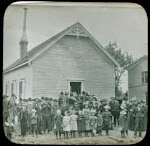Dear B. W. Schulz:
Prior to 1985 the Archives of the Episcopal Church was managed by the Historical Society of the Episcopal Church. Since that time the Archives has been incorporated separately and has been called simply the Archives of the Episcopal Church. You can find information on the Archives and its holding at http://www.episcopalarchives.org/. The document for which you search should be located there. See the correspondence below.
Sincerely,
Bob ****
Bob,
I confess that I do not know this document.
I have done some research in the matter. BPL does have a Jocelyn Murray’s abridgement of David A Shank’s Prophet Harris, the ‘Black Elijah’ of West Africa , 1994, the source of the original inquiry. In its list of abbreviations, it states ECHS stands for Episcopal Church Historical Society. Consequently, ECHS Archives would mean Episcopal Church Historical Society Archives. Unlike most of the repositories listed in the abbreviations section, the location for ECHS is not given.
In the Shank’s preface on p. xiv, however, it states, “The research service of Joyce L. White provided many of the sources in the Episcopal Church Historical Society’s archives in Austin , Texas .” That tells me the repository sought for "A Letter to the Churches, Cape Palmas , 28 July 1888, in ECHS archives" is the Archives of the Episcopal Church, Austin, and I have copied them on this email to allow them to commence their reference assistance.
It is possible the difficulty at the commencement of this chain of inquiry was bred by Google Books. Portions of Shank’s Prophet Harris is available through that tool, including some pages that have ECHS Archives in the footnote. The pages available on Google Books, however, do not include either the list of abbreviations or the preface to allow someone to track down the repository. Once again, one needs to have the printed volume in hand! By the way J. Robert Wright would have encountered difficulty addressing this question, as the GTS copy of Prophet Harris is unavailable in offsite storage.
Regards,
Julia
*****, Archivist
Bishop Payne Library
Virginia Theological Seminary
From: Bob ***
Sent: Wednesday, December 09, 2009 9:44 AM
To: ***, Julia
Subject: FW: question
Julia:
Does this document sound familiar to you?
Bob
From: Susan ***
Sent: Tuesday, December 08, 2009 11:55 PM
To: **
Subject: Fwd: question
Dear Robert,
I sent this to Bob Wright and he suggested the request was more suitable for you to answer. So, I am forwarding it to you at his suggestion. I hope you can be of assistance to Mr. Schulz.
Thank you,
Susan
Begin forwarded message:
From: Bruce Schulz
Date: December 8, 2009 4:24:42 PM CST
To: administrator@hsec.us
Subject: question
My writing partner and I are researching Samuel W. Seton, at one time a member of the Protestant Episcopal Church in Liberia . He founded his own church in 1887, and Bishop Furguson and others sent out a four page tract or letter to denounce the new religion which had Russellite leanings.
Shank and Murray cite this letter in their book on "prophet Harris" as "A Letter to the Churches, Cape Palmas , 28 July 1888, in ECHS archives."
Is this something you have? We can't identify ECHS archives based on the few photo copied pages we posses. Can you guide us? If this is your archive, please tell me how we can obtain a photocopy of this letter/tract. We would be interested in any additional material you have pertaining to Seton and his associates, especially material that shows what the Episcopal Church response was.
We're writing a follow-up to a recently published history of the Barbourite movement of the late 19th Century.
Best regards,
B. W. Schulz



